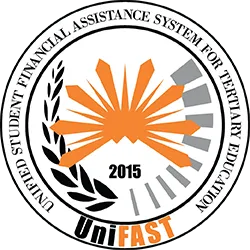
The Unified Financial Assistance System for Tertiary Education Act, or UniFAST — also known as
Republic Act No. 10687 — was signed into law in October 15, 2015. UniFAST reconciles, improves,
strengthens, expands, and puts under one body all government-funded modalities of Student
Financial Assistance Programs (StuFAPs) for tertiary education – and special purpose education
assistance – in both public and private institutions. These modalities include scholarships,
grants-in-aid, student loans and other specialized forms of StuFAPs formulated by the UniFAST
Board.
The UniFAST law – and its Implementing Rules and Regulations (IRR) – are intended to make the
implementation of StuFAPs in the tertiary level more effective, efficient, and
politically-neutral or free of political labeling.
Tertiary Education
“Tertiary Education” follows secondary education or high
school. It includes post-secondary non-degree diploma, Technical-Vocational Education and
Training (TVET) and higher education programs like baccalaureate degrees (college) and graduate
education (master’s, Ph.D., etc.).
Special Purpose Education Assistance
“Special Purpose Education Assistance”
refers to research and scientific studies in the college and masteral/doctoral level funded by
StuFAPs. It includes funding assistance for the following: Writing and publication of books,
manuscripts, theses, dissertations, scientific and technical journals Production, filming and
documentation (through digital technology) of research and studies Development of instructional
and academic materials, and science models
The UniFAST Board
The UniFAST Board consists of the Chair of CHED as UniFAST
Chair; the Director-General of the Technical Education and Skills Development Authority (TESDA)
and the Secretary of the Department of Science and Technology (DOST) as Co-Chairs; the Secretary
of the Department of Education (DepEd), representatives from the Department of Labor and
Employment (DOLE), National Economic and Development Authority (NEDA), and the National Youth
Commission (NYC) as members. The chair, co-chairs and members are with the UniFAST Board by
virtue of their permanent positions in their respective offices/ departments.
The
various StuFAP operationalizations which UniFAST coordinates are implemented by CHED, TESDA and
the following departments: DOST, DOLE, Department of Social Work and Development (DSWD),
Department of National Defense (DND), Department of Agriculture (DA), the Department of Interior
and Local Government (DILG), and the Department of Environment and Natural Resources (DENR); the
Office of the Presidential Adviser on the Peace Process (OPAPP); both Houses of Congress, and
other government instrumentalities such as the National Commission on Indigenous Peoples (NCIP),
among others. The government financial institutions (GFIs) implementing the StuFAPs include Land
Bank of the Philippines (LBP), Development Bank of the Philippines (DBP), Government Service
Insurance System (GSIS), and the Social Security System (SSS).